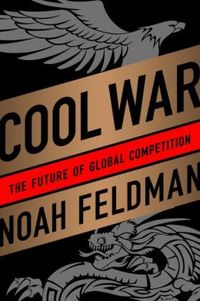

Purchase
The Future of Global Competition
Random House
June 2013
On Sale: May 21, 2013
224 pages
ISBN: 0812992741
EAN: 9780812992748
Kindle: B00BH0VSS0
Hardcover / e-Book
Add to Wish List
Non-Fiction
A bold and thought-provoking look at the future of
U.S.-China relations, and how their coming power struggle
will reshape the competitive playing field for nations
around the world
The Cold War seemingly
ended in a decisive victory for the West. But now, Noah
Feldman argues, we are entering an era of renewed global
struggle: the era of Cool War. Just as the Cold War matched
the planet’s reigning superpowers in a contest for
geopolitical supremacy, so this new age will pit the United
States against a rising China in a contest for dominance,
alliances, and resources. Already visible in Asia, the
conflict will extend to the Middle East (U.S.-backed Israel
versus Chinese-backed Iran), Africa, and beyond.
Yet this Cool War differs fundamentally from the
zero-sum showdowns of the past: The world’s major power and
its leading challenger are economically interdependent to an
unprecedented degree. Exports to the U.S. account for nearly
a quarter of Chinese trade, while the Chinese government
holds 8 percent of America’s outstanding debt. This
positive-sum interdependence has profound implications for
nations, corporations, and international institutions. It
makes what looked to be a classic contest between two great
powers into something much more complex, contradictory, and
badly in need of the shrewd and carefully reasoned analysis
that Feldman provides.
To understand the
looming competition with China, we must understand the
incentives that drive Chinese policy. Feldman offers an
arresting take on that country’s secretive hierarchy,
proposing that the hereditary “princelings” who reap the
benefits of the complicated Chinese political system are
actually in partnership with the meritocrats who keep the
system full of fresh talent and the reformers who are trying
to root out corruption and foster government accountability.
He provides a clear-eyed analysis of the years ahead,
showing how China’s rise presents opportunities as well as
risks. Robust competition could make the U.S. leaner,
smarter, and more pragmatic, and could drive China to
greater respect for human rights. Alternatively, disputes
over trade, territory, or human rights could jeopardize the
global economic equilibrium—or provoke a catastrophic “hot
war” that neither country wants.
The U.S. and
China may be divided by political culture and belief, but
they are also bound together by mutual self-interest.
Cool War makes the case for competitive cooperation
as the only way forward that can preserve the peace and make
winners out of both sides.
Comments
No comments posted.
Registered users may leave comments.
Log in or register now!
| 


 © 2003-2025 off-the-edge.net
all rights reserved Privacy Policy
© 2003-2025 off-the-edge.net
all rights reserved Privacy Policy